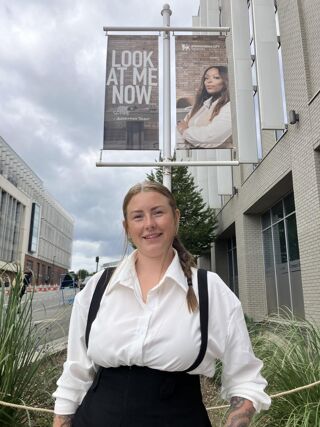When it comes to innovation and technology, coach and business travel face significant challenges in the current economic climate. Bouden Coach Travel have been supporting BCU with their BUCS (British Universities & Colleges Sport) transport for the last 13 years. Using their own vehicles and affiliate network they take our students to away fixtures across the UK. Sophie Baugh, Operations Manage at Bouden Coach Travel, recently attended a discussion about ‘Unlocking Opportunities with New Technologies’ at BCU. So, we asked Sophie to write about her journey and Bouden’s relationship with technology.
My journey
Back in 2013 I studied for my Chartered Institute of Marketing qualification at Wolverhampton University on a Distance Learning course while also working full time in a previous role. I have always been passionate about marketing and now as well as my full-time position at Bouden Coach Travel I am still involved in various marketing and website projects that cover a vast range of industries. One of my first ever accounts that I managed internally was the BCU account so I've always had a soft spot for it. Bouden have always had a brilliant relationship with the BCU and I hope that this will continue far into the future.
Customer Care Isn’t Enough
When it comes to coach travel, the truth is that customer care alone isn’t enough to drive an industry forward. Innovation matters. And in our sector, it’s been painfully lacking. Sitting in our first depot, a modest industrial unit with hand-crafted wall decorations printed from Word documents, we were already having conversations about how technology could transform our industry. That was over a decade ago. Even then, the director and I believed the systems being used and the client experience that they delivered fell far short of what was truly possible. The tech was clunky. The processes were outdated. Since then, everything else in our world (the vehicles, the offices, the depot…) has evolved. But the systems that are designed to serve us and our clients? They’ve barely moved an inch.
We’ve tried to change that. Over the years, we’ve worked with several software firms, invested thousands of pounds, and spent countless hours trying to develop a system that reflects the vision we’ve always had. But again and again, we were let down. They were interested in the invoice, not the outcome. They didn’t understand our world, and they didn’t care to. And from what I’ve seen and heard, our experience isn’t unique. It’s something that a lot of us non-tech businesses have in common: a desire to innovate, frustrated by partners who don’t truly listen.
The Rise of Tech—And Where It Went Wrong
We saw the gap in the market, and it seems we weren’t the only ones. Tech companies started circling the Private Service Vehicle and private hire sector, eager to capitalise on an industry slow to embrace digital change. But most didn’t come to solve the real problems—they came to exploit them. The rise of brokers was the first major shift. Suddenly, platforms had access to a huge pool of vehicles and drivers, which made it easier for customers to book—but it also drove prices (and standards) down. These systems promised a better customer journey but delivered the opposite. Operators were squeezed, undercut, and left to take the blame when things went wrong. Accountability vanished. The human touch disappeared. The race to the bottom had begun.
Then came demand-responsive travel and shuttle platforms. Big employers, temp agencies and local authorities were sold a dream: efficient, flexible transport through slick apps and dashboards. But the reality? These platforms once again prioritised scale over service. Operators became just another line in the budget spreadsheet. Clients still wanted high standards—but now their budget had to stretch further, split between tech firms and transport providers alike. As for operators, many of us felt backed into a corner. The margins were already tight. Refusing to work with these platforms meant missing out entirely. And if you’re not in the game, you don’t survive.
Why We’re Still in the Fight
Bouden Coach Travel much like BCU, captures the very essence of Birmingham: diverse, hardworking, and forward-thinking. Our team is proof that a varied workforce creates a culture where every idea has value, and where we constantly push to turn our vision for a better future in ground transport into reality. At Bouden, we’ve chosen to fight smarter—not just harder. We believe innovation should empower operators, not replace them. And if we want to build something that lasts, it has to be built with those who understand the day-to-day realities of this work.
Like many businesses, we’re having to adapt to tough realities. Rising National Insurance, relentless business taxes, and the constant pressure on employers have made it impossible for us to build a UK-based in-house development team. That doesn’t mean we’re giving up on tech. Far from it. We still have important work to do to find a solution that can turn our vision into reality and deliver it with integrity.
BCU Support
That’s why I attended the event on ‘Unlocking Opportunities with New Technologies’ organised by the Greater Birmingham Chamber of Commerce and BCU. We wanted to understand the tech landscape and embrace it. Professor Hanifa Shah spoke at the event and her passion and knowledge was infectious. I had no idea how much help and support was being offered to businesses by BCU and it is clear that they are doing great work not only for their students but also for local businesses, both those that are a part of the chamber and the wider community. I also discovered just how many business services the university offers — from technology grants like CreaTech Frontiers, to their innovation hub, STEAMhouse, and Knowledge Transfer Partnerships, which connect businesses with the university and one of their top graduates. For any business serious about embracing technology, this is well worth exploring.
Discover how BCU Business Services can support your business or organisation.






